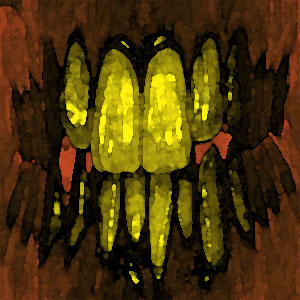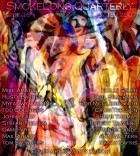When and how did “The Color of Moths” arrive to you? What challenges and/or surprises did you encounter as you translated this story from vision to text?
In the first draft of the story, the narrator was trying to recall a poem while she filled her gas tank at the filling station. She was arguing with herself over whether or not the poem was by Sylvia Plath or Elizabeth Bishop. As she remembers that the poem was Bishop’s (and one of my favorites, “The Filling Station”) she realizes her association to Plath was with the moths. The missing line is: There are moths on the window. They are the exact shade of Sylvia Plath.
I am a fan of Plath. As I wrote this piece, I discovered that I associate her with things that are far away, that are not whole. The moth is an insect that isn’t quite a butterfly. We think of them as bugs, whereas butterflies are these whole creatures, colorful, and marvelous. We mythologize butterflies. Moths are misunderstood, so I wanted to give them color, texture, their own mythology.
What meaning do moths have for you in your own life?
One thing I wanted to avoid was using what I think of as a trite metaphor for moths—the whole moth to a flame thing. This usually indicates that someone is attracted to something dangerous. On the contrary, the narrator is actually afraid of burning. She chooses the nail polish because of the name, Glass Heart. Like the moths, she believes she is safer on the other side of the glass, where she has the illusion of being close to the light without having to burn.
I relate to this. I’m someone who wants revelation without having to experience the suffering I associate with achieving it, which is where the idea of the perpetual philosophy major came in. It’s possible my father and I have had conversations similar to the conversation between the narrator and her father.
“Happy begins to sound like a non-word, one made up to describe a shade of red meant for a woman who is afraid to take off her shoes.” What’s the key to characters’ finding happiness in stories? —and people finding happiness outside of stories? And what makes you happy?
My characters often aren’t happy. They’re complicated. They’re difficult. Happiness is desired, but not necessarily a goal. I usually write characters—or at least narrators—who feel incomplete, who are searching for the missing piece, but not necessarily in the right places. Being happy is scary. I think to be happy, you have to accept everything that is; you have to live in the present without an attachment to outcomes or possibilities or the inevitable end of that which is. That sounds terribly dark, and I don’t think that I am dark. But I do think “happy” is often a farce, something we pretend to be or convince ourselves we are.
After that, I’ll lighten up and say that what makes me happy is sitting on a dock on the salt marshes of coastal South Carolina. I have a Corona in one hand and a fishing pole in the other. I don’t have to catch anything.
I have a pug named Lucy. It’s easy to make her happy, and that makes me happy. Good friends. Good family. Good books. A good red wine. And being in my pajamas.
You win The Chattahoochee Review fiction contest—and then you take a hiatus? What took you away from writing and submitting? —and what brought you back?
I kept writing. I just wasn’t showing anyone. I wrote the first draft of this story right after I won. It sat around for a year. I couldn’t figure out what was wrong with it. Then, I cut 2,000 words and realized that’s what was wrong with it. There was too much going on. “Too many notes,” as Emperor Joseph II supposedly said of Mozart.
The people in my life who encourage me to submit—my mother and father, who are writers themselves, my friends, my husband—assume that I don’t because I am afraid of rejection. I just got a rejection yesterday, and it didn’t phase me. I’m a perfectionist, a classic virgo, though you wouldn’t know if you looked in my closet. There is one word in the story that won the prize in the fiction contest that haunts me. I want to take every copy published, and correct it in red pen. It’s hard for me to know when something is finished, when it works in both a literal sense and in a figurative sense. I get lost when I write. I know how to find my way out, but I have to make sure the reader will too.
At the recent AWP conference, a number of writers talked about their old flames, books that have influenced them during a formative time in their lives—and ones they return to for lessons in writing and, of course, life. Discuss your old flame, both what it meant to you then and what it means to you now.
I grew up with poetry, though I rarely write it anymore. My parents read a lot, and read to me often when I was a child. I got the traditional childhood books, but my father would read from Dylan Thomas and e. e. cummings. I have strong memories of being almost asleep, but fighting to hear my father finish “Chanson Innocentes” and “Fern Hill.”
I think it’s mandatory, particularly for women writers, to have their Anne Sexton phase. I had mine at about eighteen. She was glamorous, smoking her cigarettes, the way she crossed her long legs, her raspy voice, the mental breakdowns. She spoke the language of angst, of self-absorption, confessing her sins and blaspheming God. I still think Sexton earned her place in the canon, but I moved on and started reading what I call “man poetry,” the strong narrative styles of James Dickey, David Bottoms, James Wright. They’re very concrete, the metaphor is subtle, sometimes instructive. You get your hands dirty when you read them.
The first short story that made an impact on me was “The Lottery” by Shirley Jackson. I was probably twelve or thirteen, and I remember being utterly horrified by the last line. It was then I realized that, like a poem, the short story offers something partial and illuminates the whole. It is difficult to do this sucessfully. I like the challenge of it. There are few things that please me more than reading a short story that punches right in the gut without any warning, though I imagine writing one of those to be the greatest feeling—what is the word?—happy.



 The core workshop of SmokeLong Fitness is all in writing, so you can take part from anywhere at anytime. We are excited about creating a supportive, consistent and structured environment for flash writers to work on their craft in a community. We are thrilled and proud to say that our workshop participants have won, placed, or been listed in every major flash competition. Community works.
The core workshop of SmokeLong Fitness is all in writing, so you can take part from anywhere at anytime. We are excited about creating a supportive, consistent and structured environment for flash writers to work on their craft in a community. We are thrilled and proud to say that our workshop participants have won, placed, or been listed in every major flash competition. Community works.